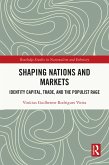As neoliberal policies advanced, rising inequality and social dissatisfaction fueled the resurgence of nationalist and populist movements in various regions of the world. The book offers a detailed study of these movements, analyzing their causes and implications in the global context. Additionally, it discusses the tensions between globalist and nationalist ideologies, addressing issues such as protectionism, economic nationalism, and the challenges to neoliberal free trade.
In the final chapter, the work proposes new global governance models aimed at reconciling national demands with global needs in a context of increasing ideological polarization. With a comprehensive and critical approach, this book is essential reading for academics, researchers, and anyone interested in understanding the contemporary challenges shaping global politics and economics.
Dieser Download kann aus rechtlichen Gründen nur mit Rechnungsadresse in A, B, CY, CZ, D, DK, EW, E, FIN, F, GR, H, IRL, I, LT, L, LR, M, NL, PL, P, R, S, SLO, SK ausgeliefert werden.









